Cultural Competence in Nursing: Meeting Diverse Healthcare Needs
VerifiedAdded on 2022/11/22
|11
|2933
|184
Essay
AI Summary
This essay delves into the critical concept of cultural competence in nursing, emphasizing the need for healthcare professionals to understand and respect the diverse cultural backgrounds of their patients. It explores three key areas: traditional healing practices, the cultural expression of pain, and the influence of religion on contraceptive use. The essay analyzes the differences between these cultural perspectives and mainstream Australian healthcare models, highlighting the challenges nurses face in providing culturally safe care. It provides insights into the importance of respecting and embracing the cultural differences that exist among patients. The essay underscores the importance of effective communication, understanding patient values, and fostering strong nurse-patient relationships to enhance patient outcomes and promote a more inclusive healthcare environment. The essay emphasizes the need for nurses to develop the ability to explore values, beliefs, and needs to build sound patient-nurse relationships.
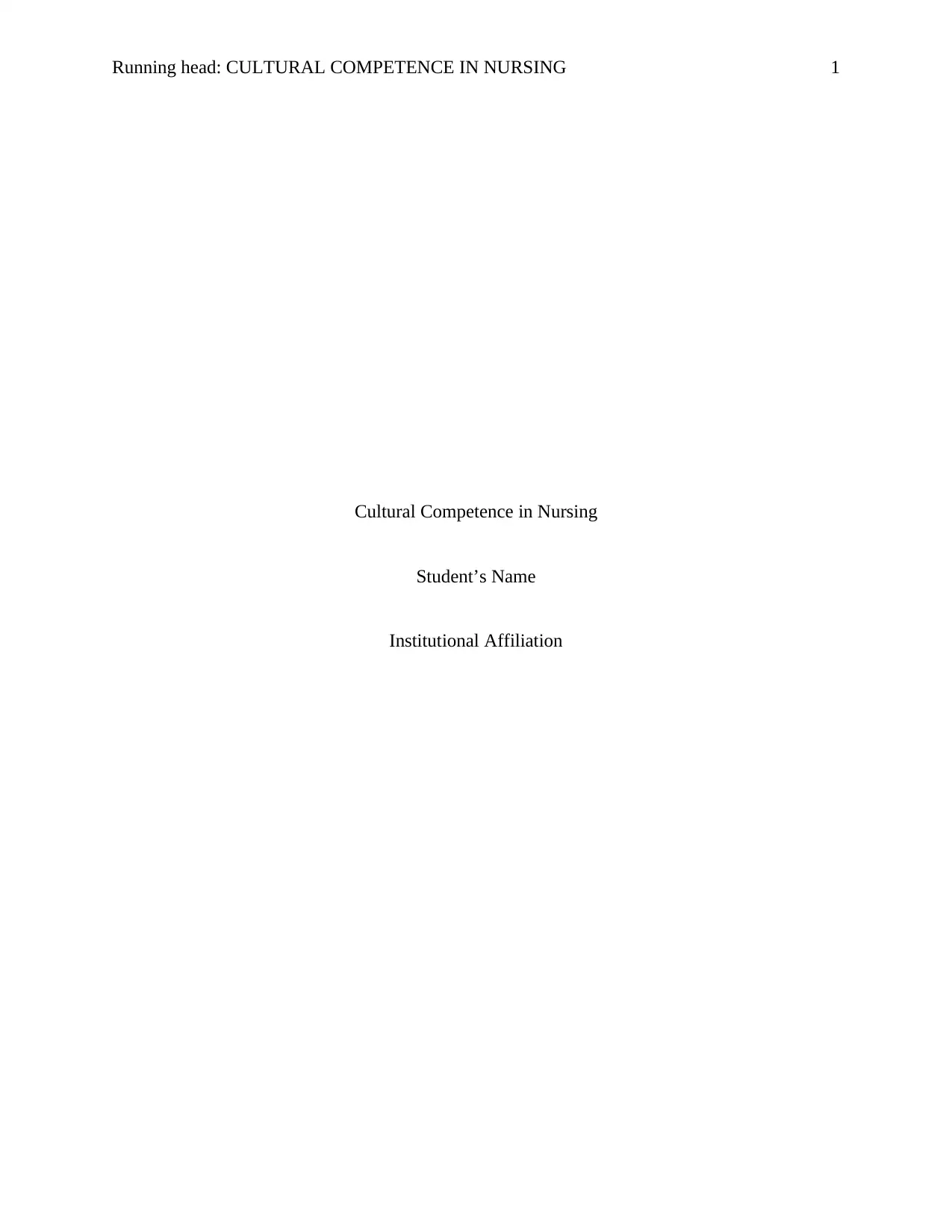
Running head: CULTURAL COMPETENCE IN NURSING 1
Cultural Competence in Nursing
Student’s Name
Institutional Affiliation
Cultural Competence in Nursing
Student’s Name
Institutional Affiliation
Paraphrase This Document
Need a fresh take? Get an instant paraphrase of this document with our AI Paraphraser
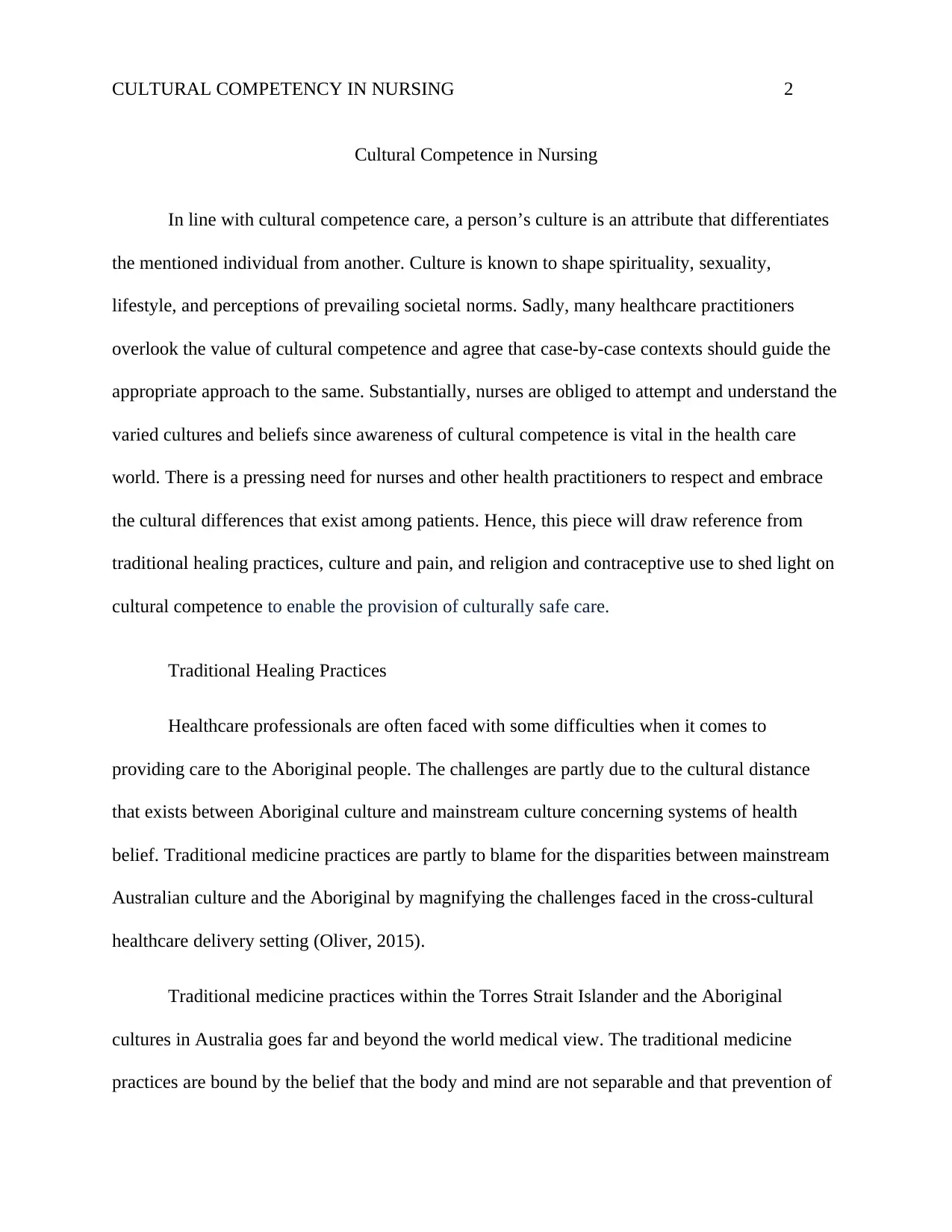
CULTURAL COMPETENCY IN NURSING 2
Cultural Competence in Nursing
In line with cultural competence care, a person’s culture is an attribute that differentiates
the mentioned individual from another. Culture is known to shape spirituality, sexuality,
lifestyle, and perceptions of prevailing societal norms. Sadly, many healthcare practitioners
overlook the value of cultural competence and agree that case-by-case contexts should guide the
appropriate approach to the same. Substantially, nurses are obliged to attempt and understand the
varied cultures and beliefs since awareness of cultural competence is vital in the health care
world. There is a pressing need for nurses and other health practitioners to respect and embrace
the cultural differences that exist among patients. Hence, this piece will draw reference from
traditional healing practices, culture and pain, and religion and contraceptive use to shed light on
cultural competence to enable the provision of culturally safe care.
Traditional Healing Practices
Healthcare professionals are often faced with some difficulties when it comes to
providing care to the Aboriginal people. The challenges are partly due to the cultural distance
that exists between Aboriginal culture and mainstream culture concerning systems of health
belief. Traditional medicine practices are partly to blame for the disparities between mainstream
Australian culture and the Aboriginal by magnifying the challenges faced in the cross-cultural
healthcare delivery setting (Oliver, 2015).
Traditional medicine practices within the Torres Strait Islander and the Aboriginal
cultures in Australia goes far and beyond the world medical view. The traditional medicine
practices are bound by the belief that the body and mind are not separable and that prevention of
Cultural Competence in Nursing
In line with cultural competence care, a person’s culture is an attribute that differentiates
the mentioned individual from another. Culture is known to shape spirituality, sexuality,
lifestyle, and perceptions of prevailing societal norms. Sadly, many healthcare practitioners
overlook the value of cultural competence and agree that case-by-case contexts should guide the
appropriate approach to the same. Substantially, nurses are obliged to attempt and understand the
varied cultures and beliefs since awareness of cultural competence is vital in the health care
world. There is a pressing need for nurses and other health practitioners to respect and embrace
the cultural differences that exist among patients. Hence, this piece will draw reference from
traditional healing practices, culture and pain, and religion and contraceptive use to shed light on
cultural competence to enable the provision of culturally safe care.
Traditional Healing Practices
Healthcare professionals are often faced with some difficulties when it comes to
providing care to the Aboriginal people. The challenges are partly due to the cultural distance
that exists between Aboriginal culture and mainstream culture concerning systems of health
belief. Traditional medicine practices are partly to blame for the disparities between mainstream
Australian culture and the Aboriginal by magnifying the challenges faced in the cross-cultural
healthcare delivery setting (Oliver, 2015).
Traditional medicine practices within the Torres Strait Islander and the Aboriginal
cultures in Australia goes far and beyond the world medical view. The traditional medicine
practices are bound by the belief that the body and mind are not separable and that prevention of
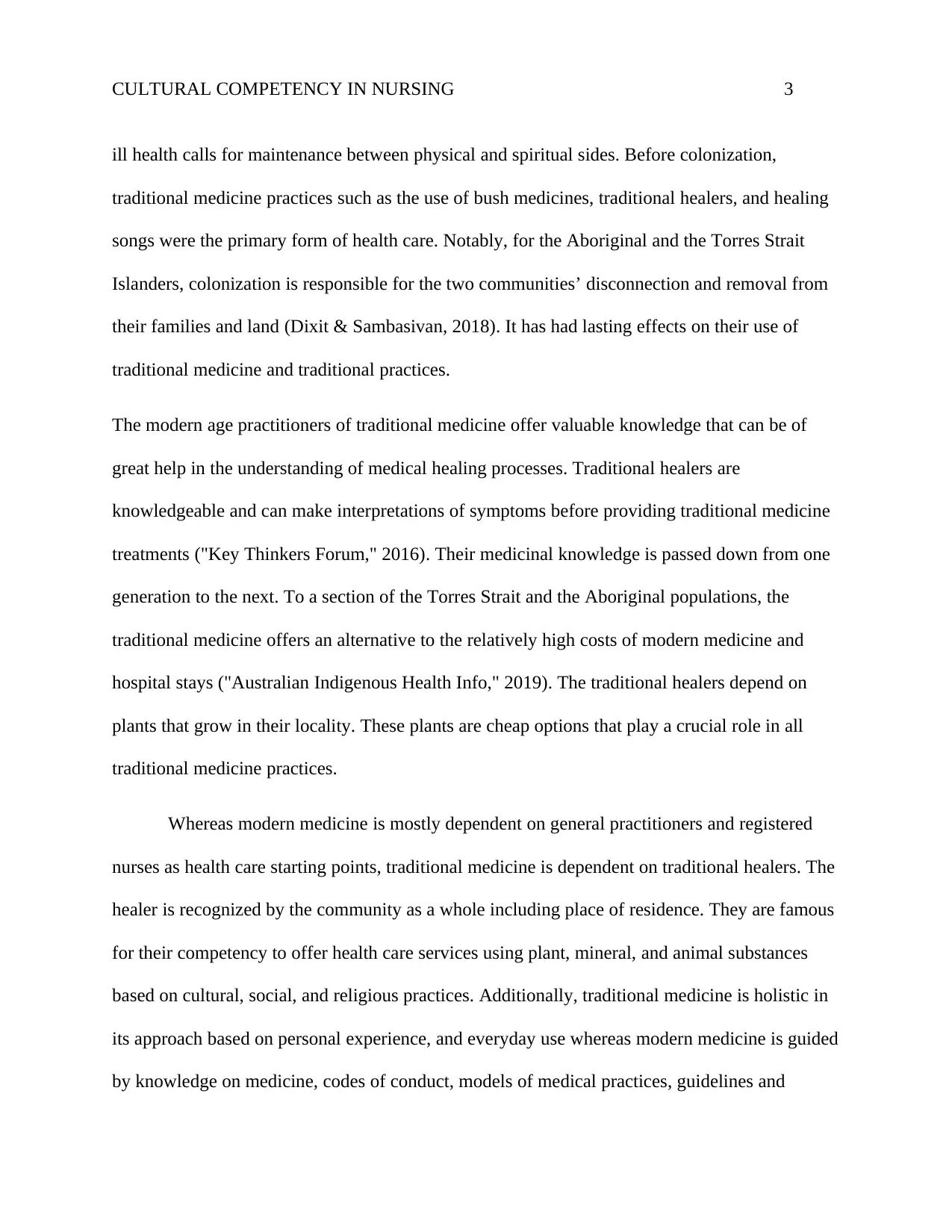
CULTURAL COMPETENCY IN NURSING 3
ill health calls for maintenance between physical and spiritual sides. Before colonization,
traditional medicine practices such as the use of bush medicines, traditional healers, and healing
songs were the primary form of health care. Notably, for the Aboriginal and the Torres Strait
Islanders, colonization is responsible for the two communities’ disconnection and removal from
their families and land (Dixit & Sambasivan, 2018). It has had lasting effects on their use of
traditional medicine and traditional practices.
The modern age practitioners of traditional medicine offer valuable knowledge that can be of
great help in the understanding of medical healing processes. Traditional healers are
knowledgeable and can make interpretations of symptoms before providing traditional medicine
treatments ("Key Thinkers Forum," 2016). Their medicinal knowledge is passed down from one
generation to the next. To a section of the Torres Strait and the Aboriginal populations, the
traditional medicine offers an alternative to the relatively high costs of modern medicine and
hospital stays ("Australian Indigenous Health Info," 2019). The traditional healers depend on
plants that grow in their locality. These plants are cheap options that play a crucial role in all
traditional medicine practices.
Whereas modern medicine is mostly dependent on general practitioners and registered
nurses as health care starting points, traditional medicine is dependent on traditional healers. The
healer is recognized by the community as a whole including place of residence. They are famous
for their competency to offer health care services using plant, mineral, and animal substances
based on cultural, social, and religious practices. Additionally, traditional medicine is holistic in
its approach based on personal experience, and everyday use whereas modern medicine is guided
by knowledge on medicine, codes of conduct, models of medical practices, guidelines and
ill health calls for maintenance between physical and spiritual sides. Before colonization,
traditional medicine practices such as the use of bush medicines, traditional healers, and healing
songs were the primary form of health care. Notably, for the Aboriginal and the Torres Strait
Islanders, colonization is responsible for the two communities’ disconnection and removal from
their families and land (Dixit & Sambasivan, 2018). It has had lasting effects on their use of
traditional medicine and traditional practices.
The modern age practitioners of traditional medicine offer valuable knowledge that can be of
great help in the understanding of medical healing processes. Traditional healers are
knowledgeable and can make interpretations of symptoms before providing traditional medicine
treatments ("Key Thinkers Forum," 2016). Their medicinal knowledge is passed down from one
generation to the next. To a section of the Torres Strait and the Aboriginal populations, the
traditional medicine offers an alternative to the relatively high costs of modern medicine and
hospital stays ("Australian Indigenous Health Info," 2019). The traditional healers depend on
plants that grow in their locality. These plants are cheap options that play a crucial role in all
traditional medicine practices.
Whereas modern medicine is mostly dependent on general practitioners and registered
nurses as health care starting points, traditional medicine is dependent on traditional healers. The
healer is recognized by the community as a whole including place of residence. They are famous
for their competency to offer health care services using plant, mineral, and animal substances
based on cultural, social, and religious practices. Additionally, traditional medicine is holistic in
its approach based on personal experience, and everyday use whereas modern medicine is guided
by knowledge on medicine, codes of conduct, models of medical practices, guidelines and
⊘ This is a preview!⊘
Do you want full access?
Subscribe today to unlock all pages.

Trusted by 1+ million students worldwide
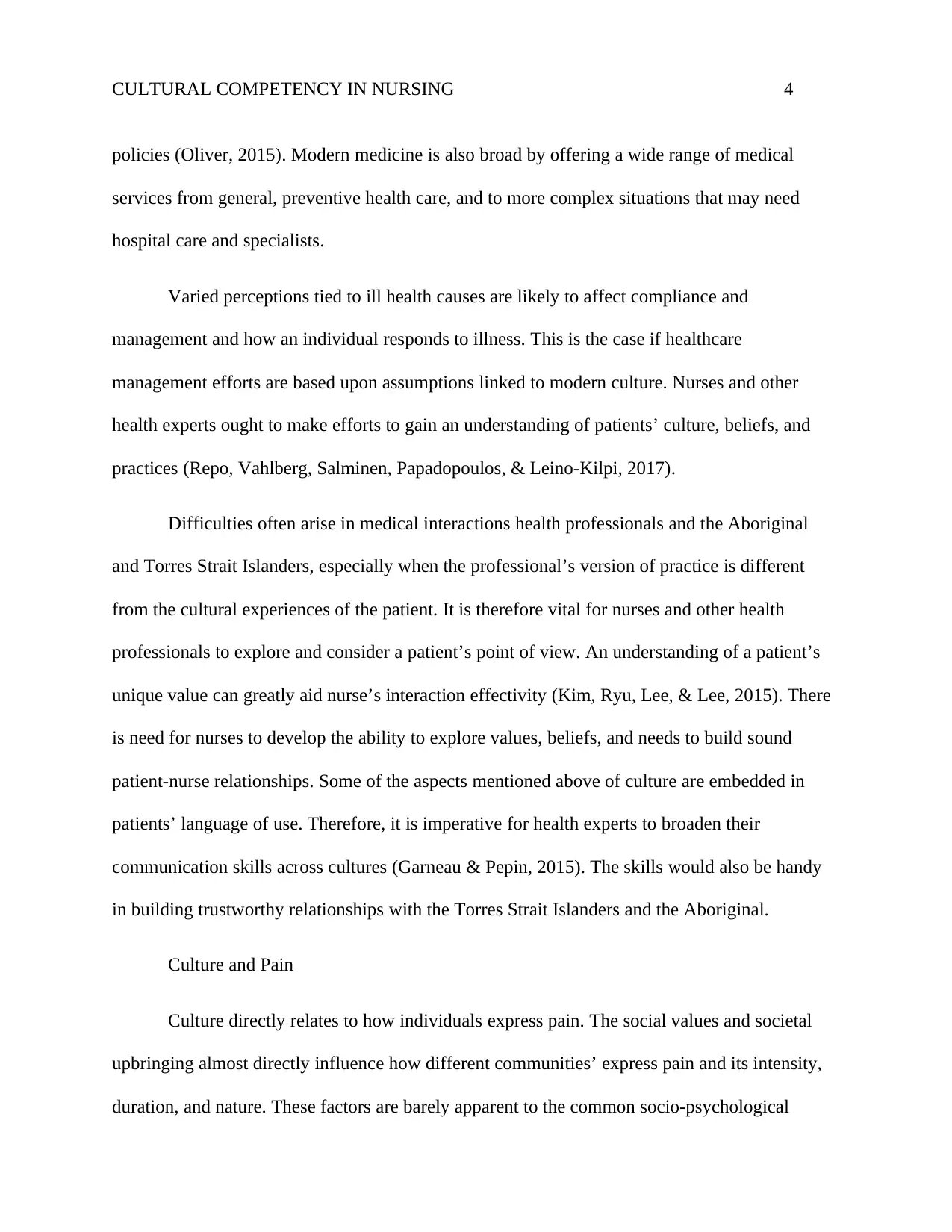
CULTURAL COMPETENCY IN NURSING 4
policies (Oliver, 2015). Modern medicine is also broad by offering a wide range of medical
services from general, preventive health care, and to more complex situations that may need
hospital care and specialists.
Varied perceptions tied to ill health causes are likely to affect compliance and
management and how an individual responds to illness. This is the case if healthcare
management efforts are based upon assumptions linked to modern culture. Nurses and other
health experts ought to make efforts to gain an understanding of patients’ culture, beliefs, and
practices (Repo, Vahlberg, Salminen, Papadopoulos, & Leino-Kilpi, 2017).
Difficulties often arise in medical interactions health professionals and the Aboriginal
and Torres Strait Islanders, especially when the professional’s version of practice is different
from the cultural experiences of the patient. It is therefore vital for nurses and other health
professionals to explore and consider a patient’s point of view. An understanding of a patient’s
unique value can greatly aid nurse’s interaction effectivity (Kim, Ryu, Lee, & Lee, 2015). There
is need for nurses to develop the ability to explore values, beliefs, and needs to build sound
patient-nurse relationships. Some of the aspects mentioned above of culture are embedded in
patients’ language of use. Therefore, it is imperative for health experts to broaden their
communication skills across cultures (Garneau & Pepin, 2015). The skills would also be handy
in building trustworthy relationships with the Torres Strait Islanders and the Aboriginal.
Culture and Pain
Culture directly relates to how individuals express pain. The social values and societal
upbringing almost directly influence how different communities’ express pain and its intensity,
duration, and nature. These factors are barely apparent to the common socio-psychological
policies (Oliver, 2015). Modern medicine is also broad by offering a wide range of medical
services from general, preventive health care, and to more complex situations that may need
hospital care and specialists.
Varied perceptions tied to ill health causes are likely to affect compliance and
management and how an individual responds to illness. This is the case if healthcare
management efforts are based upon assumptions linked to modern culture. Nurses and other
health experts ought to make efforts to gain an understanding of patients’ culture, beliefs, and
practices (Repo, Vahlberg, Salminen, Papadopoulos, & Leino-Kilpi, 2017).
Difficulties often arise in medical interactions health professionals and the Aboriginal
and Torres Strait Islanders, especially when the professional’s version of practice is different
from the cultural experiences of the patient. It is therefore vital for nurses and other health
professionals to explore and consider a patient’s point of view. An understanding of a patient’s
unique value can greatly aid nurse’s interaction effectivity (Kim, Ryu, Lee, & Lee, 2015). There
is need for nurses to develop the ability to explore values, beliefs, and needs to build sound
patient-nurse relationships. Some of the aspects mentioned above of culture are embedded in
patients’ language of use. Therefore, it is imperative for health experts to broaden their
communication skills across cultures (Garneau & Pepin, 2015). The skills would also be handy
in building trustworthy relationships with the Torres Strait Islanders and the Aboriginal.
Culture and Pain
Culture directly relates to how individuals express pain. The social values and societal
upbringing almost directly influence how different communities’ express pain and its intensity,
duration, and nature. These factors are barely apparent to the common socio-psychological
Paraphrase This Document
Need a fresh take? Get an instant paraphrase of this document with our AI Paraphraser
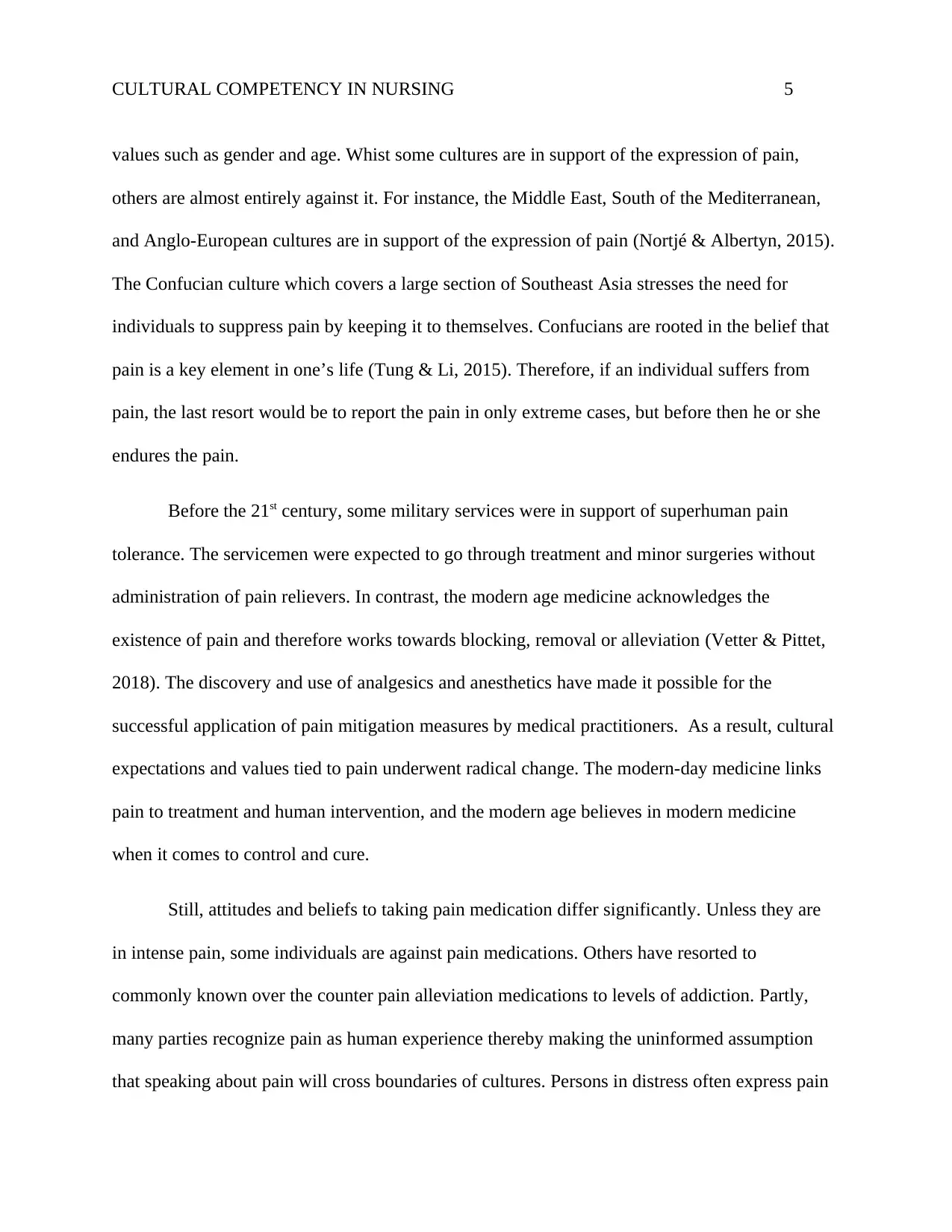
CULTURAL COMPETENCY IN NURSING 5
values such as gender and age. Whist some cultures are in support of the expression of pain,
others are almost entirely against it. For instance, the Middle East, South of the Mediterranean,
and Anglo-European cultures are in support of the expression of pain (Nortjé & Albertyn, 2015).
The Confucian culture which covers a large section of Southeast Asia stresses the need for
individuals to suppress pain by keeping it to themselves. Confucians are rooted in the belief that
pain is a key element in one’s life (Tung & Li, 2015). Therefore, if an individual suffers from
pain, the last resort would be to report the pain in only extreme cases, but before then he or she
endures the pain.
Before the 21st century, some military services were in support of superhuman pain
tolerance. The servicemen were expected to go through treatment and minor surgeries without
administration of pain relievers. In contrast, the modern age medicine acknowledges the
existence of pain and therefore works towards blocking, removal or alleviation (Vetter & Pittet,
2018). The discovery and use of analgesics and anesthetics have made it possible for the
successful application of pain mitigation measures by medical practitioners. As a result, cultural
expectations and values tied to pain underwent radical change. The modern-day medicine links
pain to treatment and human intervention, and the modern age believes in modern medicine
when it comes to control and cure.
Still, attitudes and beliefs to taking pain medication differ significantly. Unless they are
in intense pain, some individuals are against pain medications. Others have resorted to
commonly known over the counter pain alleviation medications to levels of addiction. Partly,
many parties recognize pain as human experience thereby making the uninformed assumption
that speaking about pain will cross boundaries of cultures. Persons in distress often express pain
values such as gender and age. Whist some cultures are in support of the expression of pain,
others are almost entirely against it. For instance, the Middle East, South of the Mediterranean,
and Anglo-European cultures are in support of the expression of pain (Nortjé & Albertyn, 2015).
The Confucian culture which covers a large section of Southeast Asia stresses the need for
individuals to suppress pain by keeping it to themselves. Confucians are rooted in the belief that
pain is a key element in one’s life (Tung & Li, 2015). Therefore, if an individual suffers from
pain, the last resort would be to report the pain in only extreme cases, but before then he or she
endures the pain.
Before the 21st century, some military services were in support of superhuman pain
tolerance. The servicemen were expected to go through treatment and minor surgeries without
administration of pain relievers. In contrast, the modern age medicine acknowledges the
existence of pain and therefore works towards blocking, removal or alleviation (Vetter & Pittet,
2018). The discovery and use of analgesics and anesthetics have made it possible for the
successful application of pain mitigation measures by medical practitioners. As a result, cultural
expectations and values tied to pain underwent radical change. The modern-day medicine links
pain to treatment and human intervention, and the modern age believes in modern medicine
when it comes to control and cure.
Still, attitudes and beliefs to taking pain medication differ significantly. Unless they are
in intense pain, some individuals are against pain medications. Others have resorted to
commonly known over the counter pain alleviation medications to levels of addiction. Partly,
many parties recognize pain as human experience thereby making the uninformed assumption
that speaking about pain will cross boundaries of cultures. Persons in distress often express pain
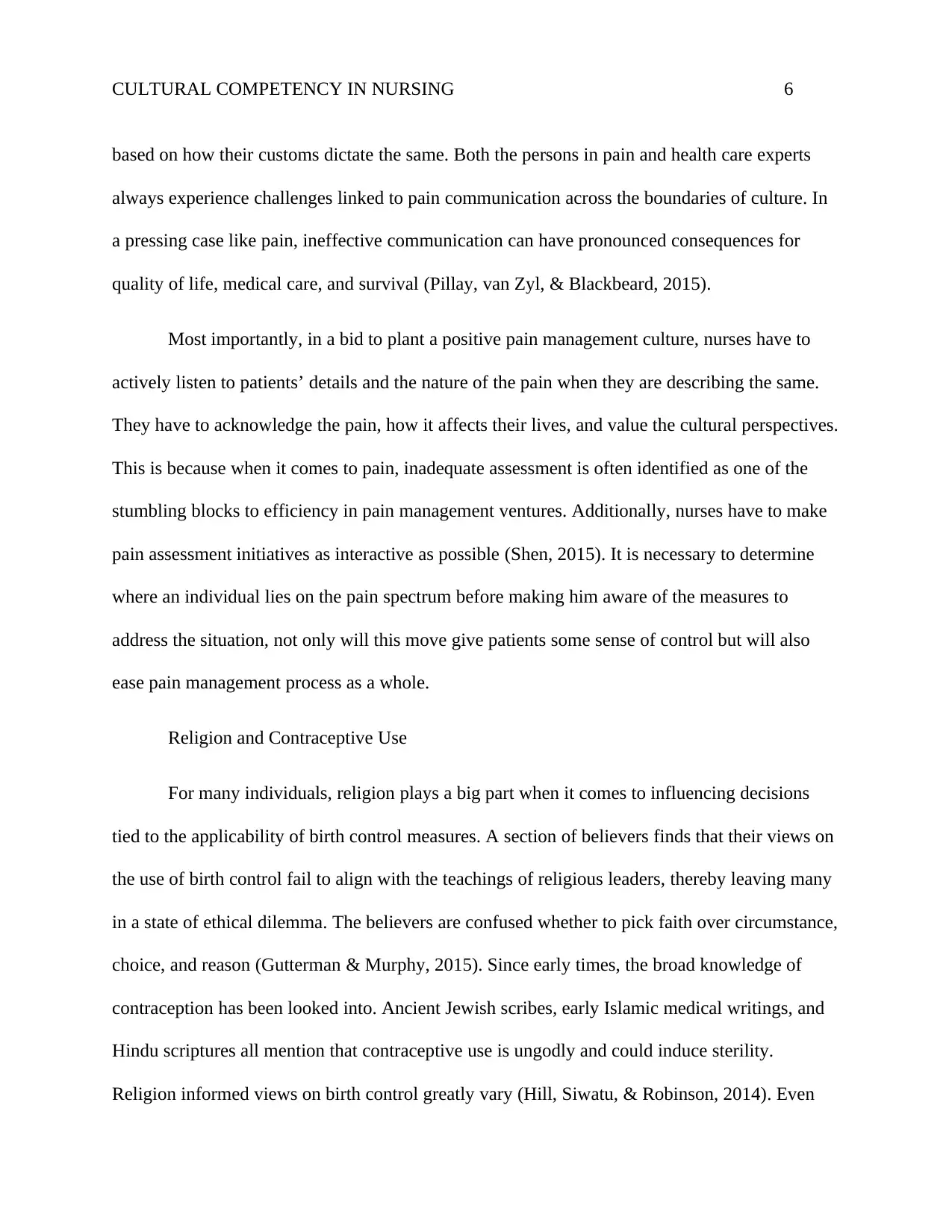
CULTURAL COMPETENCY IN NURSING 6
based on how their customs dictate the same. Both the persons in pain and health care experts
always experience challenges linked to pain communication across the boundaries of culture. In
a pressing case like pain, ineffective communication can have pronounced consequences for
quality of life, medical care, and survival (Pillay, van Zyl, & Blackbeard, 2015).
Most importantly, in a bid to plant a positive pain management culture, nurses have to
actively listen to patients’ details and the nature of the pain when they are describing the same.
They have to acknowledge the pain, how it affects their lives, and value the cultural perspectives.
This is because when it comes to pain, inadequate assessment is often identified as one of the
stumbling blocks to efficiency in pain management ventures. Additionally, nurses have to make
pain assessment initiatives as interactive as possible (Shen, 2015). It is necessary to determine
where an individual lies on the pain spectrum before making him aware of the measures to
address the situation, not only will this move give patients some sense of control but will also
ease pain management process as a whole.
Religion and Contraceptive Use
For many individuals, religion plays a big part when it comes to influencing decisions
tied to the applicability of birth control measures. A section of believers finds that their views on
the use of birth control fail to align with the teachings of religious leaders, thereby leaving many
in a state of ethical dilemma. The believers are confused whether to pick faith over circumstance,
choice, and reason (Gutterman & Murphy, 2015). Since early times, the broad knowledge of
contraception has been looked into. Ancient Jewish scribes, early Islamic medical writings, and
Hindu scriptures all mention that contraceptive use is ungodly and could induce sterility.
Religion informed views on birth control greatly vary (Hill, Siwatu, & Robinson, 2014). Even
based on how their customs dictate the same. Both the persons in pain and health care experts
always experience challenges linked to pain communication across the boundaries of culture. In
a pressing case like pain, ineffective communication can have pronounced consequences for
quality of life, medical care, and survival (Pillay, van Zyl, & Blackbeard, 2015).
Most importantly, in a bid to plant a positive pain management culture, nurses have to
actively listen to patients’ details and the nature of the pain when they are describing the same.
They have to acknowledge the pain, how it affects their lives, and value the cultural perspectives.
This is because when it comes to pain, inadequate assessment is often identified as one of the
stumbling blocks to efficiency in pain management ventures. Additionally, nurses have to make
pain assessment initiatives as interactive as possible (Shen, 2015). It is necessary to determine
where an individual lies on the pain spectrum before making him aware of the measures to
address the situation, not only will this move give patients some sense of control but will also
ease pain management process as a whole.
Religion and Contraceptive Use
For many individuals, religion plays a big part when it comes to influencing decisions
tied to the applicability of birth control measures. A section of believers finds that their views on
the use of birth control fail to align with the teachings of religious leaders, thereby leaving many
in a state of ethical dilemma. The believers are confused whether to pick faith over circumstance,
choice, and reason (Gutterman & Murphy, 2015). Since early times, the broad knowledge of
contraception has been looked into. Ancient Jewish scribes, early Islamic medical writings, and
Hindu scriptures all mention that contraceptive use is ungodly and could induce sterility.
Religion informed views on birth control greatly vary (Hill, Siwatu, & Robinson, 2014). Even
⊘ This is a preview!⊘
Do you want full access?
Subscribe today to unlock all pages.

Trusted by 1+ million students worldwide
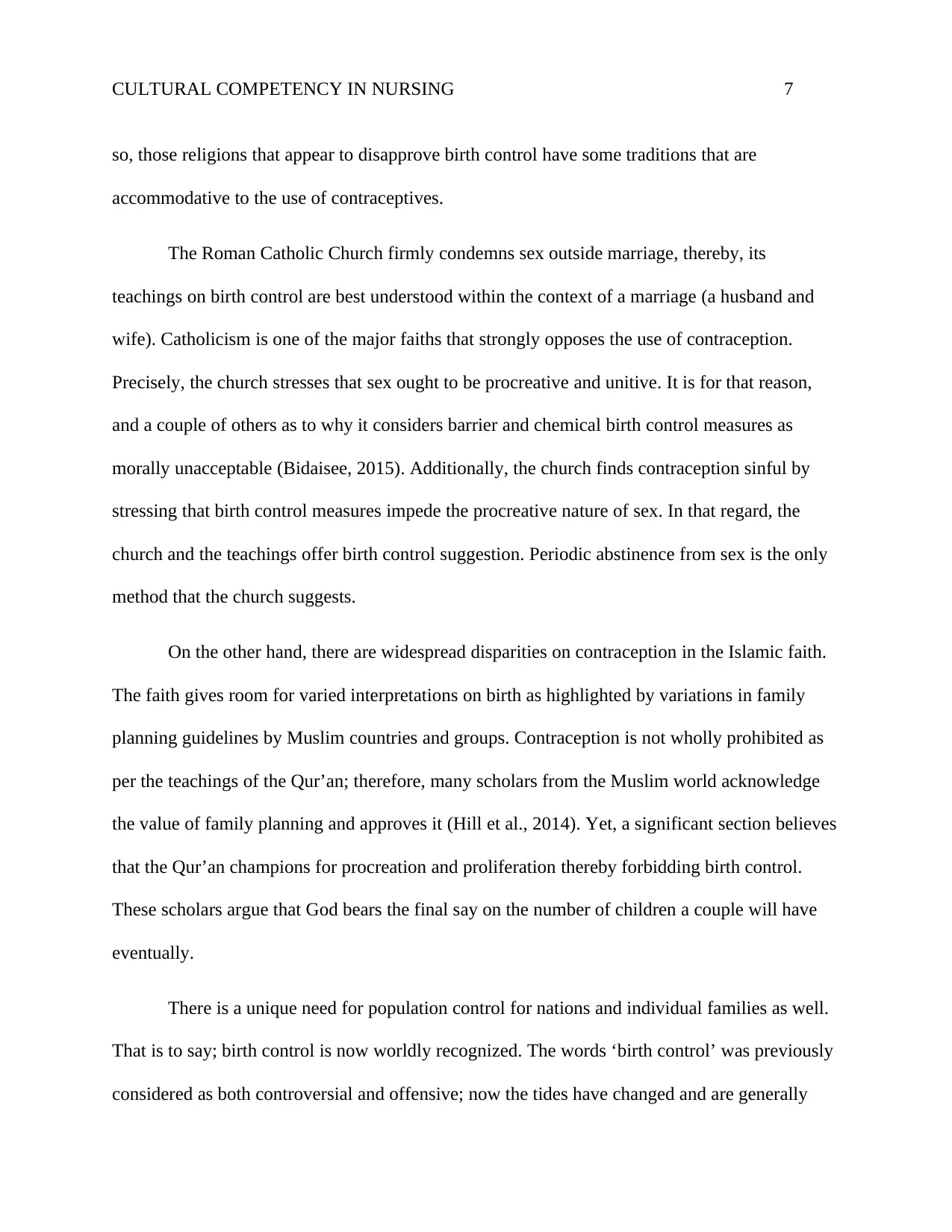
CULTURAL COMPETENCY IN NURSING 7
so, those religions that appear to disapprove birth control have some traditions that are
accommodative to the use of contraceptives.
The Roman Catholic Church firmly condemns sex outside marriage, thereby, its
teachings on birth control are best understood within the context of a marriage (a husband and
wife). Catholicism is one of the major faiths that strongly opposes the use of contraception.
Precisely, the church stresses that sex ought to be procreative and unitive. It is for that reason,
and a couple of others as to why it considers barrier and chemical birth control measures as
morally unacceptable (Bidaisee, 2015). Additionally, the church finds contraception sinful by
stressing that birth control measures impede the procreative nature of sex. In that regard, the
church and the teachings offer birth control suggestion. Periodic abstinence from sex is the only
method that the church suggests.
On the other hand, there are widespread disparities on contraception in the Islamic faith.
The faith gives room for varied interpretations on birth as highlighted by variations in family
planning guidelines by Muslim countries and groups. Contraception is not wholly prohibited as
per the teachings of the Qur’an; therefore, many scholars from the Muslim world acknowledge
the value of family planning and approves it (Hill et al., 2014). Yet, a significant section believes
that the Qur’an champions for procreation and proliferation thereby forbidding birth control.
These scholars argue that God bears the final say on the number of children a couple will have
eventually.
There is a unique need for population control for nations and individual families as well.
That is to say; birth control is now worldly recognized. The words ‘birth control’ was previously
considered as both controversial and offensive; now the tides have changed and are generally
so, those religions that appear to disapprove birth control have some traditions that are
accommodative to the use of contraceptives.
The Roman Catholic Church firmly condemns sex outside marriage, thereby, its
teachings on birth control are best understood within the context of a marriage (a husband and
wife). Catholicism is one of the major faiths that strongly opposes the use of contraception.
Precisely, the church stresses that sex ought to be procreative and unitive. It is for that reason,
and a couple of others as to why it considers barrier and chemical birth control measures as
morally unacceptable (Bidaisee, 2015). Additionally, the church finds contraception sinful by
stressing that birth control measures impede the procreative nature of sex. In that regard, the
church and the teachings offer birth control suggestion. Periodic abstinence from sex is the only
method that the church suggests.
On the other hand, there are widespread disparities on contraception in the Islamic faith.
The faith gives room for varied interpretations on birth as highlighted by variations in family
planning guidelines by Muslim countries and groups. Contraception is not wholly prohibited as
per the teachings of the Qur’an; therefore, many scholars from the Muslim world acknowledge
the value of family planning and approves it (Hill et al., 2014). Yet, a significant section believes
that the Qur’an champions for procreation and proliferation thereby forbidding birth control.
These scholars argue that God bears the final say on the number of children a couple will have
eventually.
There is a unique need for population control for nations and individual families as well.
That is to say; birth control is now worldly recognized. The words ‘birth control’ was previously
considered as both controversial and offensive; now the tides have changed and are generally
Paraphrase This Document
Need a fresh take? Get an instant paraphrase of this document with our AI Paraphraser
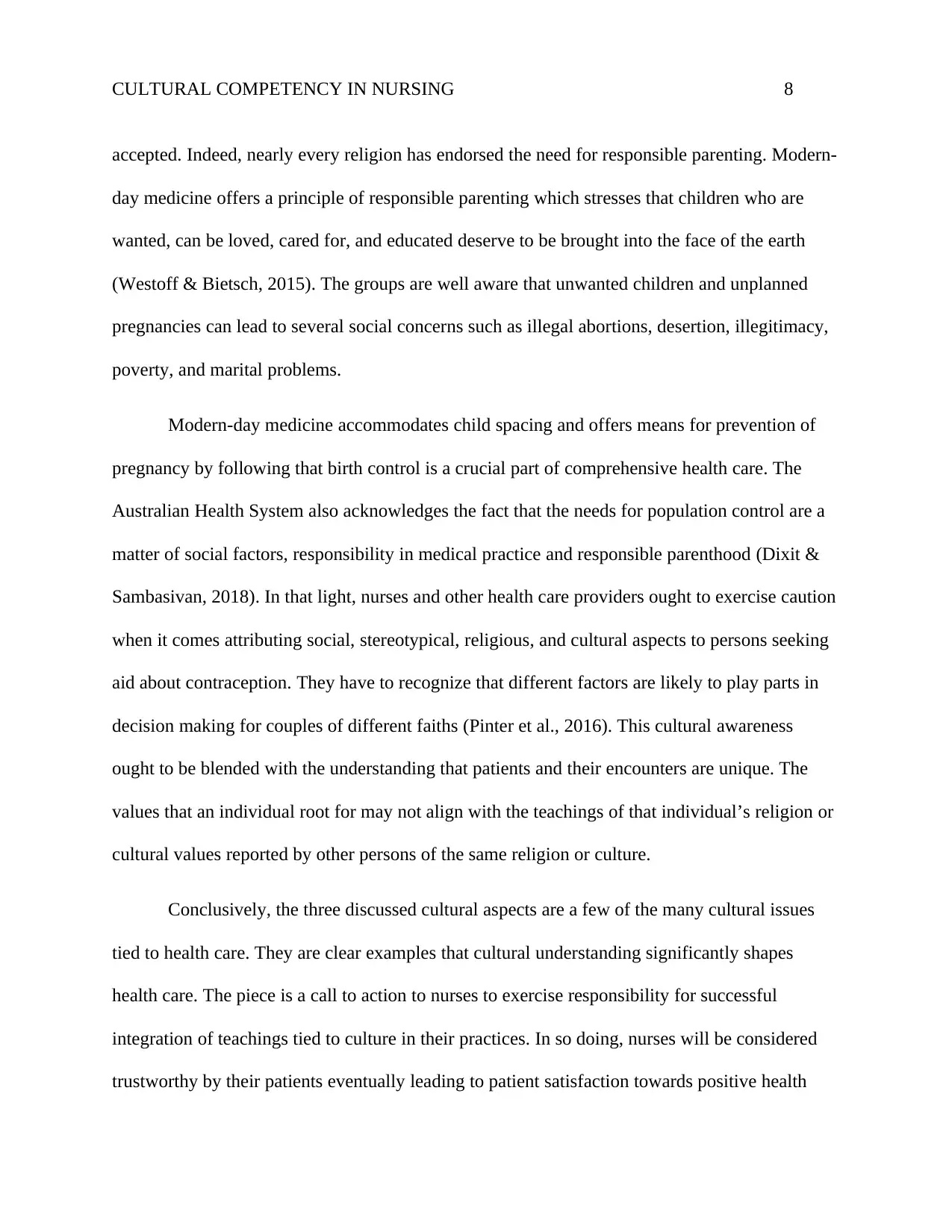
CULTURAL COMPETENCY IN NURSING 8
accepted. Indeed, nearly every religion has endorsed the need for responsible parenting. Modern-
day medicine offers a principle of responsible parenting which stresses that children who are
wanted, can be loved, cared for, and educated deserve to be brought into the face of the earth
(Westoff & Bietsch, 2015). The groups are well aware that unwanted children and unplanned
pregnancies can lead to several social concerns such as illegal abortions, desertion, illegitimacy,
poverty, and marital problems.
Modern-day medicine accommodates child spacing and offers means for prevention of
pregnancy by following that birth control is a crucial part of comprehensive health care. The
Australian Health System also acknowledges the fact that the needs for population control are a
matter of social factors, responsibility in medical practice and responsible parenthood (Dixit &
Sambasivan, 2018). In that light, nurses and other health care providers ought to exercise caution
when it comes attributing social, stereotypical, religious, and cultural aspects to persons seeking
aid about contraception. They have to recognize that different factors are likely to play parts in
decision making for couples of different faiths (Pinter et al., 2016). This cultural awareness
ought to be blended with the understanding that patients and their encounters are unique. The
values that an individual root for may not align with the teachings of that individual’s religion or
cultural values reported by other persons of the same religion or culture.
Conclusively, the three discussed cultural aspects are a few of the many cultural issues
tied to health care. They are clear examples that cultural understanding significantly shapes
health care. The piece is a call to action to nurses to exercise responsibility for successful
integration of teachings tied to culture in their practices. In so doing, nurses will be considered
trustworthy by their patients eventually leading to patient satisfaction towards positive health
accepted. Indeed, nearly every religion has endorsed the need for responsible parenting. Modern-
day medicine offers a principle of responsible parenting which stresses that children who are
wanted, can be loved, cared for, and educated deserve to be brought into the face of the earth
(Westoff & Bietsch, 2015). The groups are well aware that unwanted children and unplanned
pregnancies can lead to several social concerns such as illegal abortions, desertion, illegitimacy,
poverty, and marital problems.
Modern-day medicine accommodates child spacing and offers means for prevention of
pregnancy by following that birth control is a crucial part of comprehensive health care. The
Australian Health System also acknowledges the fact that the needs for population control are a
matter of social factors, responsibility in medical practice and responsible parenthood (Dixit &
Sambasivan, 2018). In that light, nurses and other health care providers ought to exercise caution
when it comes attributing social, stereotypical, religious, and cultural aspects to persons seeking
aid about contraception. They have to recognize that different factors are likely to play parts in
decision making for couples of different faiths (Pinter et al., 2016). This cultural awareness
ought to be blended with the understanding that patients and their encounters are unique. The
values that an individual root for may not align with the teachings of that individual’s religion or
cultural values reported by other persons of the same religion or culture.
Conclusively, the three discussed cultural aspects are a few of the many cultural issues
tied to health care. They are clear examples that cultural understanding significantly shapes
health care. The piece is a call to action to nurses to exercise responsibility for successful
integration of teachings tied to culture in their practices. In so doing, nurses will be considered
trustworthy by their patients eventually leading to patient satisfaction towards positive health
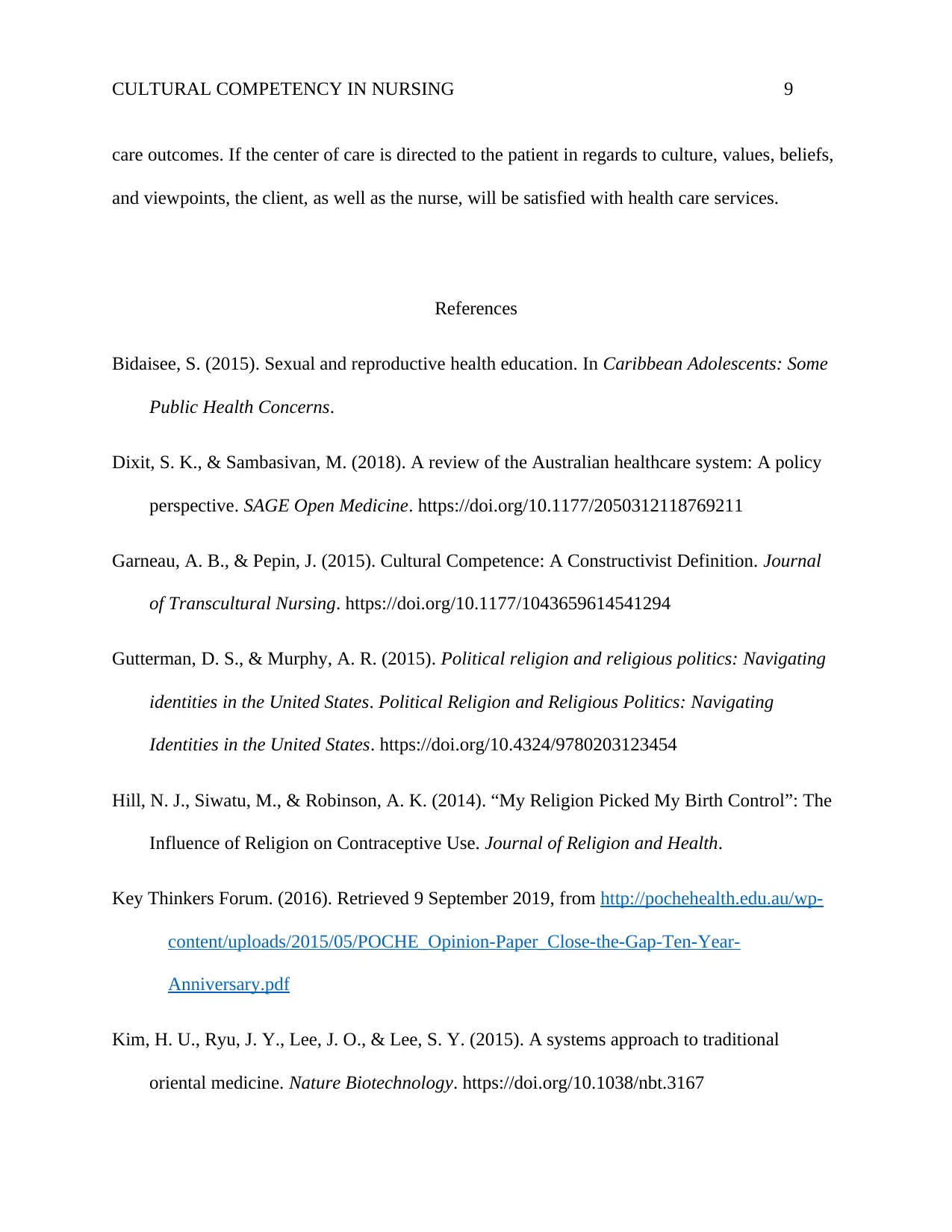
CULTURAL COMPETENCY IN NURSING 9
care outcomes. If the center of care is directed to the patient in regards to culture, values, beliefs,
and viewpoints, the client, as well as the nurse, will be satisfied with health care services.
References
Bidaisee, S. (2015). Sexual and reproductive health education. In Caribbean Adolescents: Some
Public Health Concerns.
Dixit, S. K., & Sambasivan, M. (2018). A review of the Australian healthcare system: A policy
perspective. SAGE Open Medicine. https://doi.org/10.1177/2050312118769211
Garneau, A. B., & Pepin, J. (2015). Cultural Competence: A Constructivist Definition. Journal
of Transcultural Nursing. https://doi.org/10.1177/1043659614541294
Gutterman, D. S., & Murphy, A. R. (2015). Political religion and religious politics: Navigating
identities in the United States. Political Religion and Religious Politics: Navigating
Identities in the United States. https://doi.org/10.4324/9780203123454
Hill, N. J., Siwatu, M., & Robinson, A. K. (2014). “My Religion Picked My Birth Control”: The
Influence of Religion on Contraceptive Use. Journal of Religion and Health.
Key Thinkers Forum. (2016). Retrieved 9 September 2019, from http://pochehealth.edu.au/wp-
content/uploads/2015/05/POCHE_Opinion-Paper_Close-the-Gap-Ten-Year-
Anniversary.pdf
Kim, H. U., Ryu, J. Y., Lee, J. O., & Lee, S. Y. (2015). A systems approach to traditional
oriental medicine. Nature Biotechnology. https://doi.org/10.1038/nbt.3167
care outcomes. If the center of care is directed to the patient in regards to culture, values, beliefs,
and viewpoints, the client, as well as the nurse, will be satisfied with health care services.
References
Bidaisee, S. (2015). Sexual and reproductive health education. In Caribbean Adolescents: Some
Public Health Concerns.
Dixit, S. K., & Sambasivan, M. (2018). A review of the Australian healthcare system: A policy
perspective. SAGE Open Medicine. https://doi.org/10.1177/2050312118769211
Garneau, A. B., & Pepin, J. (2015). Cultural Competence: A Constructivist Definition. Journal
of Transcultural Nursing. https://doi.org/10.1177/1043659614541294
Gutterman, D. S., & Murphy, A. R. (2015). Political religion and religious politics: Navigating
identities in the United States. Political Religion and Religious Politics: Navigating
Identities in the United States. https://doi.org/10.4324/9780203123454
Hill, N. J., Siwatu, M., & Robinson, A. K. (2014). “My Religion Picked My Birth Control”: The
Influence of Religion on Contraceptive Use. Journal of Religion and Health.
Key Thinkers Forum. (2016). Retrieved 9 September 2019, from http://pochehealth.edu.au/wp-
content/uploads/2015/05/POCHE_Opinion-Paper_Close-the-Gap-Ten-Year-
Anniversary.pdf
Kim, H. U., Ryu, J. Y., Lee, J. O., & Lee, S. Y. (2015). A systems approach to traditional
oriental medicine. Nature Biotechnology. https://doi.org/10.1038/nbt.3167
⊘ This is a preview!⊘
Do you want full access?
Subscribe today to unlock all pages.

Trusted by 1+ million students worldwide
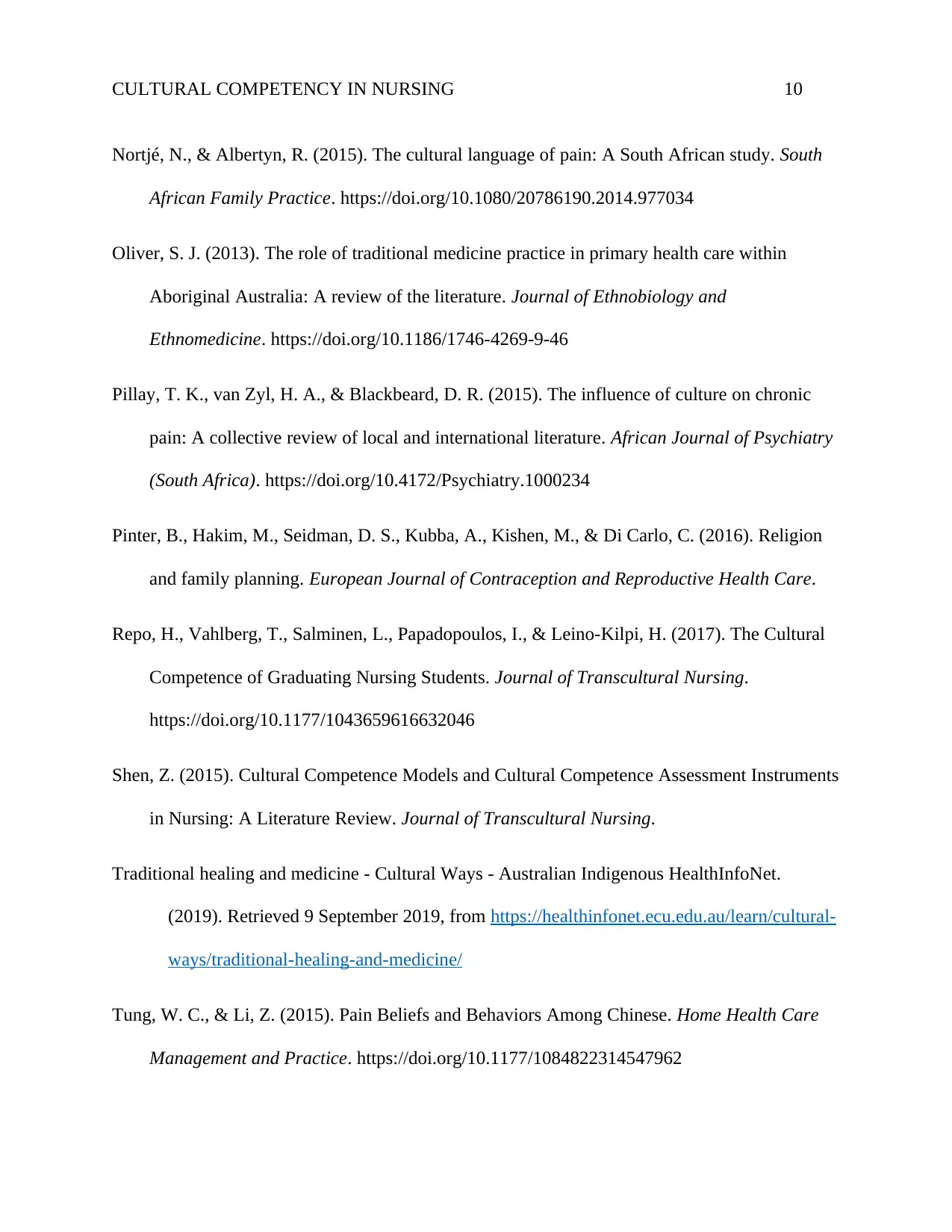
CULTURAL COMPETENCY IN NURSING 10
Nortjé, N., & Albertyn, R. (2015). The cultural language of pain: A South African study. South
African Family Practice. https://doi.org/10.1080/20786190.2014.977034
Oliver, S. J. (2013). The role of traditional medicine practice in primary health care within
Aboriginal Australia: A review of the literature. Journal of Ethnobiology and
Ethnomedicine. https://doi.org/10.1186/1746-4269-9-46
Pillay, T. K., van Zyl, H. A., & Blackbeard, D. R. (2015). The influence of culture on chronic
pain: A collective review of local and international literature. African Journal of Psychiatry
(South Africa). https://doi.org/10.4172/Psychiatry.1000234
Pinter, B., Hakim, M., Seidman, D. S., Kubba, A., Kishen, M., & Di Carlo, C. (2016). Religion
and family planning. European Journal of Contraception and Reproductive Health Care.
Repo, H., Vahlberg, T., Salminen, L., Papadopoulos, I., & Leino-Kilpi, H. (2017). The Cultural
Competence of Graduating Nursing Students. Journal of Transcultural Nursing.
https://doi.org/10.1177/1043659616632046
Shen, Z. (2015). Cultural Competence Models and Cultural Competence Assessment Instruments
in Nursing: A Literature Review. Journal of Transcultural Nursing.
Traditional healing and medicine - Cultural Ways - Australian Indigenous HealthInfoNet.
(2019). Retrieved 9 September 2019, from https://healthinfonet.ecu.edu.au/learn/cultural-
ways/traditional-healing-and-medicine/
Tung, W. C., & Li, Z. (2015). Pain Beliefs and Behaviors Among Chinese. Home Health Care
Management and Practice. https://doi.org/10.1177/1084822314547962
Nortjé, N., & Albertyn, R. (2015). The cultural language of pain: A South African study. South
African Family Practice. https://doi.org/10.1080/20786190.2014.977034
Oliver, S. J. (2013). The role of traditional medicine practice in primary health care within
Aboriginal Australia: A review of the literature. Journal of Ethnobiology and
Ethnomedicine. https://doi.org/10.1186/1746-4269-9-46
Pillay, T. K., van Zyl, H. A., & Blackbeard, D. R. (2015). The influence of culture on chronic
pain: A collective review of local and international literature. African Journal of Psychiatry
(South Africa). https://doi.org/10.4172/Psychiatry.1000234
Pinter, B., Hakim, M., Seidman, D. S., Kubba, A., Kishen, M., & Di Carlo, C. (2016). Religion
and family planning. European Journal of Contraception and Reproductive Health Care.
Repo, H., Vahlberg, T., Salminen, L., Papadopoulos, I., & Leino-Kilpi, H. (2017). The Cultural
Competence of Graduating Nursing Students. Journal of Transcultural Nursing.
https://doi.org/10.1177/1043659616632046
Shen, Z. (2015). Cultural Competence Models and Cultural Competence Assessment Instruments
in Nursing: A Literature Review. Journal of Transcultural Nursing.
Traditional healing and medicine - Cultural Ways - Australian Indigenous HealthInfoNet.
(2019). Retrieved 9 September 2019, from https://healthinfonet.ecu.edu.au/learn/cultural-
ways/traditional-healing-and-medicine/
Tung, W. C., & Li, Z. (2015). Pain Beliefs and Behaviors Among Chinese. Home Health Care
Management and Practice. https://doi.org/10.1177/1084822314547962
Paraphrase This Document
Need a fresh take? Get an instant paraphrase of this document with our AI Paraphraser
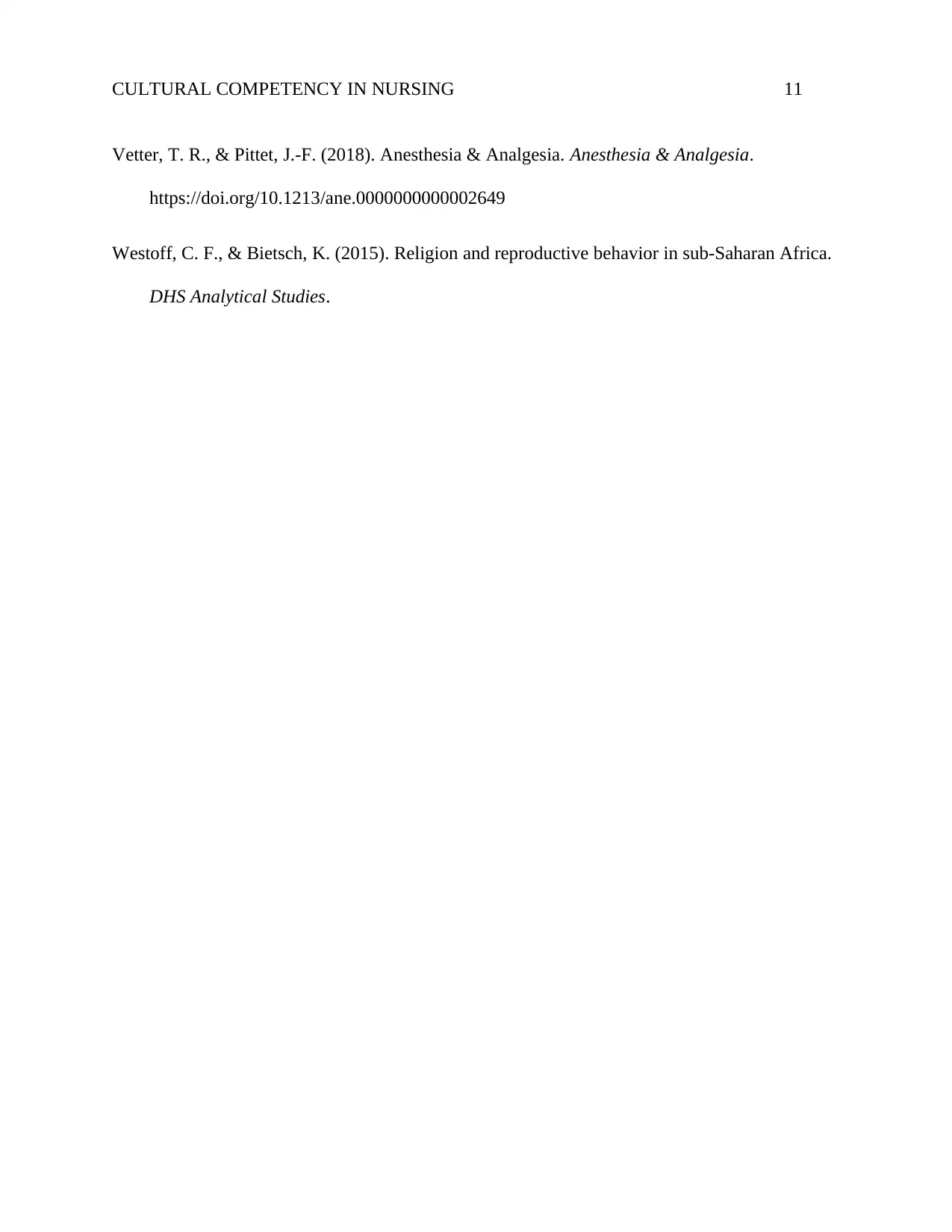
CULTURAL COMPETENCY IN NURSING 11
Vetter, T. R., & Pittet, J.-F. (2018). Anesthesia & Analgesia. Anesthesia & Analgesia.
https://doi.org/10.1213/ane.0000000000002649
Westoff, C. F., & Bietsch, K. (2015). Religion and reproductive behavior in sub-Saharan Africa.
DHS Analytical Studies.
Vetter, T. R., & Pittet, J.-F. (2018). Anesthesia & Analgesia. Anesthesia & Analgesia.
https://doi.org/10.1213/ane.0000000000002649
Westoff, C. F., & Bietsch, K. (2015). Religion and reproductive behavior in sub-Saharan Africa.
DHS Analytical Studies.
1 out of 11
Related Documents
Your All-in-One AI-Powered Toolkit for Academic Success.
+13062052269
info@desklib.com
Available 24*7 on WhatsApp / Email
![[object Object]](/_next/static/media/star-bottom.7253800d.svg)
Unlock your academic potential
Copyright © 2020–2026 A2Z Services. All Rights Reserved. Developed and managed by ZUCOL.





